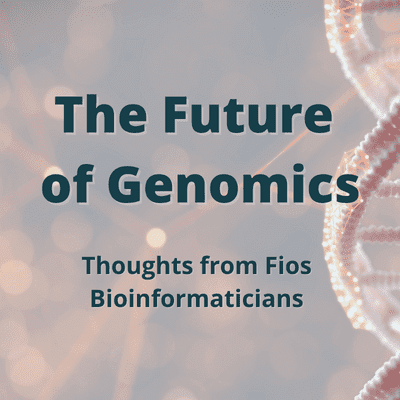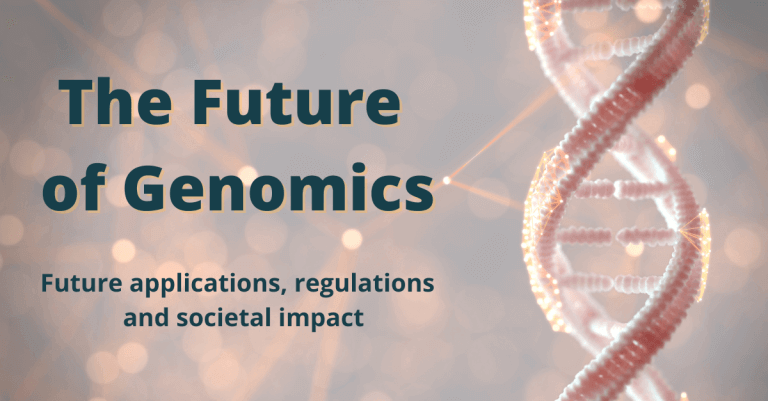The Future of Genomics
- 1st September 2022
- Posted by: Breige McBride
- Category: Uncategorised

Wondering what the future of genomics is going to look like? You are not the only one. With advances in genomic sequencing technologies bringing the cost of sequencing a human genome down drastically; from $450m since the first reference human genome in 2003 to under $500 just 20 years later – human genomic sequencing is now more accessible than ever. This accessibility brings with it many possibilities and everyone, from governments to industry to individuals, is beginning to realise this. For now, the future of genomics is uncertain and unregulated.

The future of Genomics: more regulations
However, it likely won’t remain unregulated for long. In January 2022, the UK Government published Genomics Beyond Health, a report exploring the future of genomics science. Possible future applications of genomics data within the report include the use of genomics information within the car insurance industry and the criminal justice system. There is a future possibility that information in your DNA could affect how much you pay for car insurance or what type of sentence you would receive for committing a crime. These are just two of the endless possibilities.
The report aims to provide ‘a basis for discussion’ within UK government departments. It is a starting point for policymakers to educate themselves about the future possibilities of genomics data and the ethical implications which may arise from these. Government policies across different departments will contain sections relating to genomics data and its applications before too long.
Currently, medical research uses genomics data widely and a likely advancement in this area will be using an individual’s genomic data to tailor their medical treatment. In other words, personalised medicine is something we can expect from the future of genomics. At Fios Genomics, our bioinformaticians already regularly analyse genomics data to advance medical research. So we decided to ask them for their own thoughts on the future of genomics.
What future applications of genomics data are Fios bioinformaticians looking forward to?
Perhaps unsurprisingly, the future application of genomics data that Fios bioinformaticians are most looking forward to is personalised medicine. Our team mentioned this often in their answers. One bioinformatician described it as a “much-needed new, tailored approach to healthcare”.
Synthetic biology is the next application that our bioinformaticians are most looking forward to. Some of the team are simply excited about the possibility of creating new forms of life. However, other bioinformaticians think climate change will make synthetic biology increasingly necessary. With droughts becoming more common, one bioinformatician remarked that improvements in genetic modification of plant and animal life could benefit the world’s drought-stricken regions.
What future applications of genomics data do Fios Genomics’ bioinformaticians worry about?
Our bioinformaticians have two main concerns about the future of genomics – discrimination and privacy. The thought of industries like the insurance industry, using genomics data to risk-assess people based on their DNA, is certainly something our bioinformatics team find concerning. Reoccurring remarks around genomics applications where behaviour is predicted and people are treated differently due to those predictions (for example, with higher or lower insurance premiums) all centred on discrimination.
Our team also have concerns about data privacy. They feel that everyone should have control over their own genomics data and its privacy. Also, the team feel strongly that any mandatory collection and use of genomics data is something to avoid.
What do our bioinformaticians think about how genomics data should be regulated?
Overall, our team feels that it should be up to an individual to decide how their genomics data is used. Most of the team believes that individuals should choose whether to add their genomic information to research databases. However, others felt that there would be a significant benefit to medical research if all sequenced human genome data was added to medical research databases, in an anonymised format.
There was also some discussion around public vs private sector data ownership, with a general preference for the public sector. On the subject of personalised medicine, and how researchers should analyse clinical trial data in this context, one of our bioinformaticians suggests that researchers encode the genomic data and only make analysis results visible.
What type of impact will future developments in genomics have on society?
In general, our bioinformatics team believe that future advances in genomics will have a positive impact on society. A minority of the team anticipates that there will be both positive and negative outcomes.
General thoughts on the future of genomics
The one thing that our bioinformaticians can agree on is that we are going to see researchers using genomic data in many new ways in the future, although their thoughts regarding timescales differ. Their comments include:
“It’s a rapidly changing discipline! Who knows what the future might bring?”
“I feel like it it’s still going to take a while before genomic data can be used for businesses outside education, healthcare and art.”
“With great power comes great responsibility! We are in an age of hyper-advancements in technology. I think genomic information is going to become even more readily available and utilised over the next 10 years, and there will need to be strict monitoring to ensure that individual privacy is at the forefront of developments.”
It is clear that we are at an exciting time in history when it comes to genomic science. At Fios, what excites us most about the future of genomics is how genomic advances will impact medical research. We also look forward to learning how future applications of genomics data may benefit society as a whole.
Author: Breige McBride, Content and Social Media Manager, Fios Genomics
Reviewed by Fios Genomics Bioinformatics Experts to ensure accuracy
See also:
Genomic Sequencing & Data Analysis: A Cost Timeline
Predictions for Bioinformatics in 2022
Bioinformatics Buyer’s Guide – Outsourcing Handbook
Using Biobank Data to Reach Your Research Goals
Genomics Beyond Health – Preparing for a Genomic Future
Leave a Reply
You must be logged in to post a comment.

